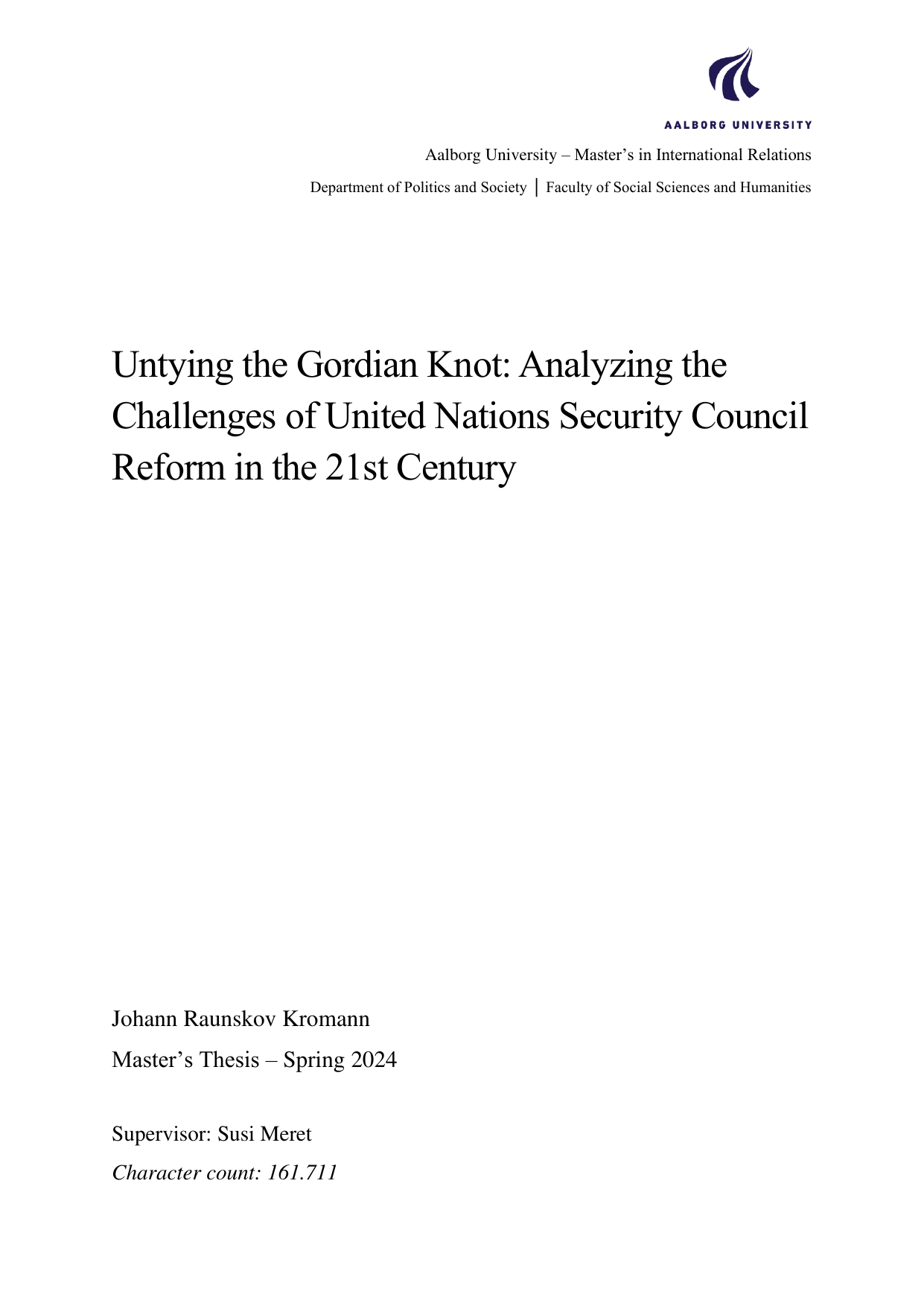
Untying the Gordian Knot: Analyzing the Challenges of United Nations Security Council Reform in the 21st Century: Untying the Gordian Knot: Analyzing the Challenges of United Nations Security Council Reform in the 21st Century
Author
Term
4. semester
Education
Publication year
2024
Submitted on
2024-05-31
Pages
77
Abstract
In this master's thesis, the reform of the United Nations Security Council (UNSC) is analyzed through the research question: Why do efforts towards reforming the United Nations Security Council face persistent challenges despite widespread recognition of the necessity for change? The Thesis serves as an explanatory case study of reform proceedings at the UN level, specifically examining the annual Intergovernmental Negotiations Framework during the 78th Session of the United Nations General Assembly. The thesis uses document analysis of official UN documents, national statements from member states, and field notes created while participating in the IGN proceedings to strengthen its narrative. This thesis first lays out the historical context of the work of the Council and the reform debate before explaining the situation as of May 2024. The thesis then moves to its analysis, where it first analyzes reform through the theoretical framework of liberal institutionalism, examining factors such as institutional design, divergence of interests and preferences between member states, incrementalism within reform proceedings, and the conduct of the P5 and its impact on reform. The thesis then turns to a policy-level analysis through the implementation of the multiple streams framework. Here, the thesis examines the problem, policy, and politics streams before determining the policy entrepreneurs in the policy process and whether a policy window has been presented. Subsequently, the thesis interprets its findings in the discussion and lays out the limitations of both the thesis and its findings. The thesis concludes that the efforts towards reforming the council face persistent challenges due to a number of factors. Most importantly, there are significant divergences in the preferences of the member states in reform proceedings, mainly driven by national interest, as well as conduct by the permanent members of the Council that seeks to prevent reform. This is further strengthened by the high threshold needed for structural reform of the Council, which has constrained opportunities to reach consensus and created institutional inertia that makes the Council resistant to change. It further concludes that while the Russian invasion of Ukraine and the Israel-Hamas War have led to widespread calls for the necessity of reform, it has complicated reform proceedings by shifting the focus to structural reform instead of the more obtainable workings methods reform.
In this master's thesis, the reform of the United Nations Security Council (UNSC) is analyzed through the research question: Why do efforts towards reforming the United Nations Security Council face persistent challenges despite widespread recognition of the necessity for change? The Thesis serves as an explanatory case study of reform proceedings at the UN level, specifically examining the annual Intergovernmental Negotiations Framework during the 78th Session of the United Nations General Assembly. The thesis uses document analysis of official UN documents, national statements from member states, and field notes created while participating in the IGN proceedings to strengthen its narrative. This thesis first lays out the historical context of the work of the Council and the reform debate before explaining the situation as of May 2024. The thesis then moves to its analysis, where it first analyzes reform through the theoretical framework of liberal institutionalism, examining factors such as institutional design, divergence of interests and preferences between member states, incrementalism within reform proceedings, and the conduct of the P5 and its impact on reform. The thesis then turns to a policy-level analysis through the implementation of the multiple streams framework. Here, the thesis examines the problem, policy, and politics streams before determining the policy entrepreneurs in the policy process and whether a policy window has been presented. Subsequently, the thesis interprets its findings in the discussion and lays out the limitations of both the thesis and its findings. The thesis concludes that the efforts towards reforming the council face persistent challenges due to a number of factors. Most importantly, there are significant divergences in the preferences of the member states in reform proceedings, mainly driven by national interest, as well as conduct by the permanent members of the Council that seeks to prevent reform. This is further strengthened by the high threshold needed for structural reform of the Council, which has constrained opportunities to reach consensus and created institutional inertia that makes the Council resistant to change. It further concludes that while the Russian invasion of Ukraine and the Israel-Hamas War have led to widespread calls for the necessity of reform, it has complicated reform proceedings by shifting the focus to structural reform instead of the more obtainable workings methods reform.
Keywords
Documents
